But starting with action on the product’s tertiary or transport packaging – the material that protects and ships the product in bulk through distribution – can lead to more immediate results for packaging waste reduction and help set the operational and cultural conditions for greater success downstream when consumer compliance is needed. CPG suppliers and their retail partners have an opportunity today to make meaningful strides and quantifiable impacts on their end goals by transitioning to a reusable system for their transport packaging.
Research conducted by the World Economic Forum and the Ellen MacArthur Foundation reports that 10% of the reuse potential in the plastic packaging market is from transport packaging (labeled as “large rigid containers”) and from dunnage material like pallet wraps, which often can be eliminated with reusable products. When adding up the current amount of non-plastic single-use containers in CPG and retail supply chains, the reuse and waste-elimination potential skyrockets for CPG companies.
RPA member The Kroger Company provides an excellent example of the actions and results from targeting transport packaging. As part of their goal to divert 90% or more of solid waste from landfills by 2020, in route to be a “Zero Waste” company, Kroger adopted a circular economy model by incorporating systems with reusable plastic containers (RPCs) and pooled pallets, achieving source reduction of millions of pounds of single-use packaging requiring waste management from disposal.
In carrying this foundation of waste prevention forward to their customers, Kroger just announced it will phase out single-use plastic bags and transition to reusable bags across its Family of Stores by 2025. With the operational and cultural framework in place for the reuse of tertiary and secondary packaging, Kroger is better positioned to have positive influence on customer behaviors for their reuse and recycling of primary product packaging, a key focus of the CPG goals. And this is a reciprocal winning relationship, as Mintel research shows 63% of US shoppers believe reusable and repurposable packaging is a key factor in purchasing decisions.
CPG companies can assist retailers like Kroger and expand packaging source reduction by converting their own tertiary packaging into a reusable system. The derived benefits would not just be environmental, but also lead to performance and cost-saving advantages. CPG conversion to reusable transport packaging can also spur synergies and innovations with their retail customers, such as enabling better load utilization, automation compatibilities and one-touch handling in warehouse and fulfillment centers, all minus the accumulation of packaging waste.
Conversion to reusable transport packaging systems does not have to wait until 2025, as reusable products and services are widely available and used today. And the Reusable Packaging Association (RPA) serves as a resource assisting companies at all points in the supply chain with their reusable packaging needs. When making commitments to design out waste and adopt a systems’ approach for the management of materials, converting to reusable packaging for supply chain distribution of consumer products is a great place to start.
– – – – –
Tim Debus
President & CEO
Reusable Packaging Association

